With International Women’s Day this Sunday, March 8th and the salon industry being a vastly women-dominated one, something quite exceptional, Phorest Salon Software wanted to dig deeper into the data and see if women really, are dominating.
The same struggles as in other industries?
In terms of numbers, women are certainly the most represented in the industry, with 66% of survey respondents being women. However, in many of the stats that truly matter, it seems that the same inequality between men and women observed in other industries can also be seen in salons and spas.
45% of women in the UK salon industry are university educated, having completed a diploma, degree or masters, compared to just 20% of men. But only 52% of women in the industry earn over £25k in annual income, compared to 90% of men.
According to research done by Phorest Salon Software, March 2020
Women in the industry tend to have achieved a higher level of education than their male counterparts, with 85% of women having completed formal education past their GCSEs and AS/A Levels — versus 75% of men. Nearly half (45%) of the women surveyed were university educated, having completed a diploma, degree or masters — compared to just 20% of men.
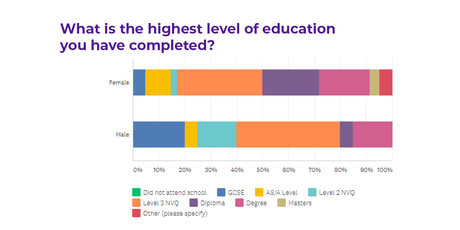
Yet, despite both higher levels of education in favour of the women surveyed and an equal footing when it comes to having dependents — 45% of the men surveyed had children against 48% of women, — it was men who tended to run larger salons than women. Our survey results showed that 85% of men ran salons with three or more staff, compared to 62% of women.
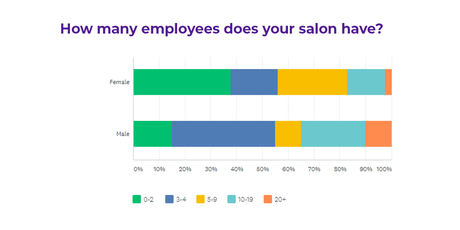
Of course, these findings meant there was a rather large gap when looking at the average annual income of men in the salon industry versus women: only 52% of women earned over £25k in annual income, compared to 90% of men.
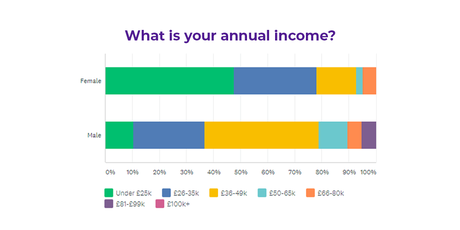
Perhaps this is due to women in the salon industry falling victim to the same struggles when it comes to confidence as they do in other industries. The women surveyed rated their confidence as a business person on average as 5 out of 10, compared to men who averaged 8.2 out of 10.
Women losing out professionally for bearing children
As we mentioned, proportionately, the men and women surveyed counted more-or-less equal numbers of parents vs non-parents — 45% of men had dependents versus 48% of women.
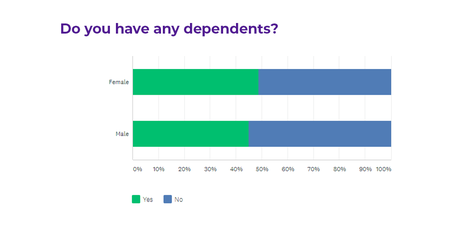
Despite this, the earning potential of men versus women with dependents significantly differed. Just as in other industries, women’s careers suffer after bearing children, while men’s seem to continue to grow stronger.
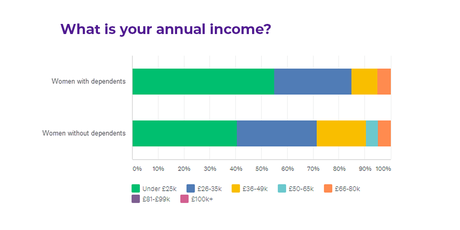
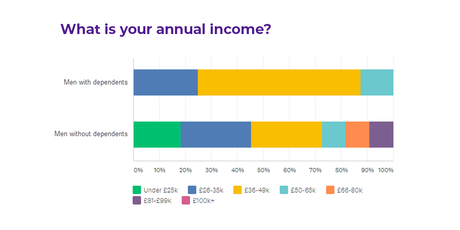
Almost two-thirds (60%) of women without children reported they earn more than £25k in annual income. For the women who had stated they had children, this dropped to 45%.
For men, however, the opposite is true: 82% of men without children made over £25k, while 100% of men with children reported earning over this figure.
Despite many of those surveyed being business owners, it appears that women in the salon industry don’t get the same support from their partners to return to work after having children as their male counterparts. The women surveyed rated their work-life balance an average of 5 out of 10, compared to men who averaged at 6.3 out of 10.
In summary

Melanie Icke, Head of Education & Training at Phorest Salon Software, commented: “Though the salon industry is often held as a shining example of a female-dominated industry, contributing over £6.6 billion to the UK economy, it’s disappointing to see many of these women falling victim to the same inequalities as they do in most other industries. At Phorest, we are constantly trying to provide free resources to help salon owners improve their business acumen and confidence, with initiatives such as our free 6-part Salon Management Course, as well as our Salon Mentorship Hub, where salon owners can book a consultation with a topic expert of their choice. These initiatives are completely free for all salon owners, not just for Phorest clients.“
To end on a positive note, despite the disappointing data uncovered in this research, when asked where or whom they turn to for business advice, 64% of women said they would most likely turn to other salon owners. It’s heartening to see this strong culture of women supporting other women in the industry. We also provide a private Facebook group for salon owners to share their experiences and get positive advice from peers.
Got feedback? Let us know either in the comments below or tweet us @ThePhorestWord! (Pssst! We’re on Instagram too!)
Thanks for reading! #LetsGrow
